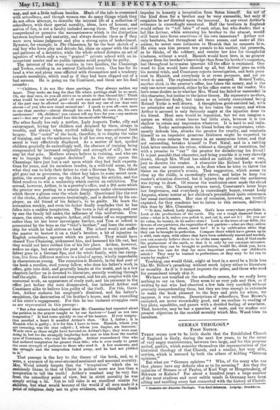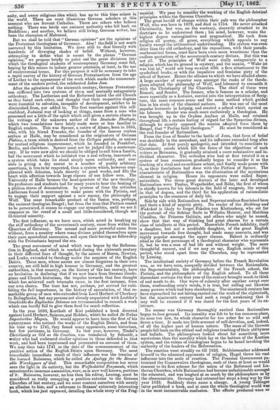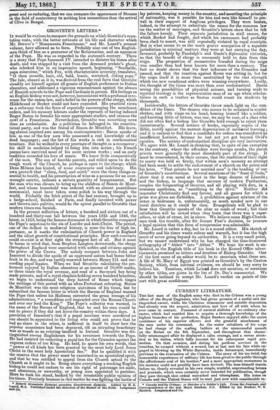united, parties, which consider themselves the representatives of the
section, which is accused by both the others of holding a au
" that phrase have any definite idea as to its meaning ? Are they the of the most studious and most subtle minds in Germany have beed sifting and resifting every fact connected with the history of Ch unity, and every religious idea which has up to this time arisen in the world. There are most illustrious German scholars at this moment who are fervent Catholics. There are others who believe notbinz,. There was lately one eminent authority who fell back on Buddhism ; and another, we believe still living, German writer, has been the champion of Mahound. But we shall be told that " German opinions" are the opinions of the Protestant theologians of Germany. Alas ! the field is not much narrowed by this limitation. We have still to deal literally with hundreds of diverging shades of belief. Without, however, attempting to define what is meant by the phrase " German opinions, ' we propose briefly to point out the great divisions into which the theological students of contemporary Germany must fall, hoping by this means to induce greater precision, at least, in the use of controversial terms. For this purpose it will be necessary to take a rapid survey of the history of German Protestantism from the age of Luther to the appearance of the work which marks the commence- ment of the modem period, the celebrated Leben Jesu.
After the agitations of the sixteenth century, German Protestant- ism stiffened into two systems of stern and mutually antagonistic orthodoxy. The Lutherans and the Reformed hated the old Church as they hated each other, and thought that their respective dogmas were essential to salvation, incapable of development, neither to be diminished from, nor added to. The first reaction against this self- confident, Judaical way of looking at things, came from a man who possessed not a little of the spirit which still gives a certain charm to the writings of the unknown author of the Deutsche Theologie, which two translations have lately made more or less familiar to English readers. This was Spener, a native of Alsace, born in 1635, who, with his friend Francke, the founder of the famous orphan asylum at Halle, may be considered as the originators of German Pietism, a term which is derived from the Collegia pedals, or unions for mutual religions improvement., which he founded in Frankfort; Berlin, and elsewhere. Spener must not be judged like a contempo- rary. If he were now alive we should be obliged to call him a fanatic, but the movement which he initiated was a real reform, inasmuch as a system which takes its stand simply upon authority, and con- sists in giving a dry assent to a number of purely arbitrary assertions, is less to be respected, than a system which, however com- plicated with delusion, leads directly to good works, and fills the heart with affection towards large classes of our fellow men. The University of Halle became the head-quarters of the new theology. Its professors and students had for many years to bear the beating of a pitiless storm of denunciation. In process of time the orthodox Lutherans found it necessary to make peace with the Pietists, and to engage their support against a new enemy, the philosophy of Wolf. The most remarkable product of the fusion was, perhaps, the eminent theologian Bengel ; but from the time that Pietism ceased to be persecuted, it ceases to engage our sympathies, until we see it reappear as the creed of a small and little-considered, though not ill-treated minority.
The first influence, as we have seen, which acted in breaking up the stiff orthodoxy of the seventeenth century, came from within the Churches of Germany. The second and more powerful came from without, from a country where many divines prided themselves upon their pure apostolical succession, and upon their having no fellowship with the Protestants beyond the sea.
The „great movement of mind which was begun by the Reforma- tion in England, and which is marked during the sixteenth century in their different lines of thought, by the names of Bacon, Newton, and Locke, extended to theology under the auspices of the English Deists. These men, whose names are almost forgotten in their own country, are still held in high honour in Germany, and the greatest authorities, in that country, on the history of the last century, have no hesitation in declaring that if we now learn from German theolo- gians and Church historians, the impulse towards that free thought which has achieved such triumphs came, in the first instance, from our own shores. The time has not, perhaps, yet arrived for exhi- biting the full importance, in the history of speculation, of that re- markable group of men who extended from Lord Herbert of Cherbury to Bolingbroke, but any persons not already acquainted with Lechler's Geschichle des Englischen Deismus are recommended to consult a work which can hardly fail to give them food for much reflection.
In the year 1680, Kortholt of Kiel published a book directed against Lord Herbert, Spinoza,and Hobbes, which he called _De Tribus Impostoribus Magnin. He would appear to have been the first of his countrymen who noticed the works of the English Deists, and from his time up to 1741, they found many opponents, some historians, but few partizans, in Germany. In that year, however, Tindal's Christianity as Old as the Creation, was translated by Schmidt, a writer who had embraced similar opinions to those defended in that work, and had been imprisoned and persecuted on account of them. We may then take 1741 as the date of the commencement of the positive action of the English Deists upon Germany. The most remarkable immediate result of their influence was the treatise of the learned Reimarus, which he called ..4n Apology for the Reason- able Worshippers of God. This remarkable composition has never seen the light in its entirety, but the Woffeabittel Fragments, which occasioned so immense asensation, were, as is now well known, portions of it. Reimarus, however, no less than his editor, Lessiug, must be considered as, really occupying a position exterior to the German Churches of last century, and we must content ourselves with merely an allusion to him, and a reference to Strauss' extremely interesting book, which has just appeared, detailing the whole'story of the Frag- mentist. We pass to consider the working of the English deistical principles within the German Churches. The great herald of change within their pale was the philosopher Wolf, who was born in 1679, and died in 1754. He never attacked Christianity, but was, on the contrary, sincerely attached to its doctrines as he understood them ; his mind, however, wasiu the highest degree unimaginative and pragmatical. He took from religion all poetry, all grace, everything which appeals to any faculty except the arithmetical understanding. His system was even drier than the old orthodoxy, and his expositions, with their pseudo- mathematical forms, must have been even more wearisome than the endless quotations of the seventeenth century divines. But this was not all. The principles of Wolf were really antagonistic to a religion which has its ground in mystery, and the maxim, "Wahr ist was klai ist," could not long co-exist with a firm attachment to the symbolical books, or with the impulsive and feminine piety of the school of Speller. Hence the alliance to which we have alluded above. A large number of superior men amongst the ranks of the theolo- gians adopted the philosophy of 'Wolf,' and laboured to reconcile it with the Christianity of the Churches. The chief of these were Emesti, and Semler. The former, who is famous as a scholar, and more especially as a Latinist, carried into the interpretation of Scrip- ture, the same common sense and the same method which guided him in his study of the classical authors. He was one of the most popular lecturers in Leipzig, and created a school which carried on his labours. Semler was much more exclusively a theologian. He was brought up in the Orphan Asylum at Halle, and retained throughout life a certain feeling of regard for the Spenerian divines, although he stoutly opposed the maxim adopted from them by Bengel, that "Pettus facet theologum." He must be considered as the real founder of Rationalism.
From the time of Semler to the battle of Jena, that form of belief was decidedly in the ascendant, and its influence extended long after that date. At first purely apologetic, and intended to conciliate to Christianity minds which felt the force of the objections of such writers as Reimarus, it gradually attained a more substantive and in- dividual character. The orthodox who had at first treated it as a system of base concession gradually began to consider it as the teaching of a rival and co-ordinate school, and finally made peace with it, as their forefathers had done with the Pietism a Spener. The characteristic of Rationalism was the elimination of the mysterious element in religion. Hence its opponents were called Super- naturalists. The three-great doctors of the later and developed Rationalism were Paulus, Wegscheider, and Rohr, the first of whom is chiefly known for his labours in the field of exegesis, the second in that of doo'ma, and the third for his application of rationalistic principles to the concerns of daily life.
Side by side with Rationalism and Supernaturalism flourished here and there a kind of negotic piety. No reader of the Dichtung and Wahrheit is likely to forget Fraulen von Klettenberg, who sat for the portrait of the Schou Seele in Wilhelm Meister, and Matthias Claudius, the Princess Galitzin, and otters who might be named, show that that way of thinking had great charms for a certain class of intellects at this period. Meanwhile French infidelity, itself a daughter, but not a creditable daughter, of the great English movement towards free thought, had made many converts, and was highly popular amongst the upper classes. Babrot is ordinarily cited as the first personage of a theological character who represents it, but he was a man of bad life and without weight. The more thoughtful earnest, and if we may so say, English minds of this period, who stood apart from the Churches, may be represented by Lensing.
The intellectual society of Germany before the French Revolution was, as we have seen, unequally divided between the Rationalists, the Supernaturalists, the philosophers of the French school, the Pietists, and the philosophers of the English school. To all these discordant sections the first year of the century brought much to think of and much to do. One wave of calamity after another swept over them, confounding men's minds, it is true, but calling out likewise many powers which had been slumbering. The-nineteenth century has been reproached for not having carried out the work of the eighteenth, but the nineteenth century had such a rough awakening that it may well be excused if it was dazed for the first years of its ex- istence.
No sooner was Germany thoroughly excited than Rationalism began to lose ground. Its morality was felt, to be too common-place, its aims too low, its whole character far too sober for so wild and fierce a time. It made too little account of self-devotion, and, indeed. of all the higher part of human nature. The mass of the German people fell back on the ethical and religious teaching of their old hymns and ballads. The philosophers looked about for something more mysterious than the morality which lay at the bottom of the Kantian system, and the voices of theologians beau to be heard invoking the authority of the leaders of the Reformation.
The reaction went steadily on till 1833. Schleiermacher addressed himself to the educated opponents of religion, Hegel threw his vast influence into the scale of reaction. The Prussian Government pa- tronized the Conservative theologians, such of them at least as would consent to its first scheme for the union of the Reformed and Lu- theran Churches, while Rationalism had become unfashionable amongst the educated, and was laughed at as much by the philosophers as by the obscurantists. Germany had retraced her steps a long way by the year 1833. Suddenly there came a change. A young 1Thinger tutor published a book, and at once the whole theological world was in the most inconceivable confusion. The effects produced were so
great and so enduring, that we can compare the appearance of Strauss in the field of controversy to nothing less momentous than the arrival of Clive in Bengal.
































 Previous page
Previous page